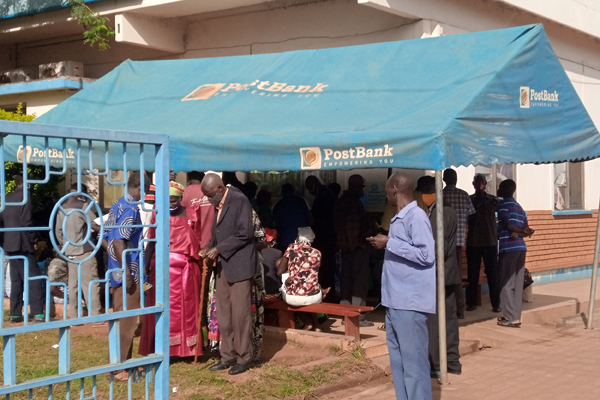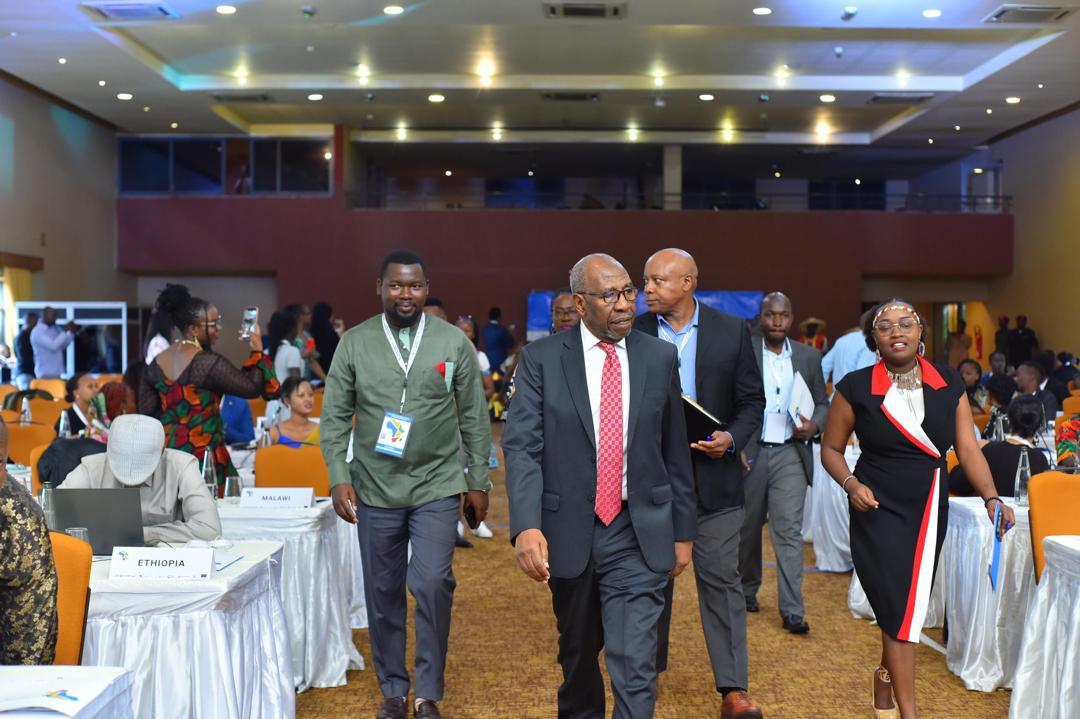Prime
Elders rush to activate bank accounts to get pay for cattle

Elderly people from Lango Sub-region queue at Post Bank, Lira Branch, yesterday to reactivate their accounts. PHOTO/Bill Oketch
What you need to know:
Last month, government released a list of 42,200 beneficiaries in the districts of Lango. These include victims who sought legal redress for their lost livestock.
- The elders are yet to receive money for compensation for cattle lost in the LRA insurgency.
For the last one week, people whose names have appeared on the list of beneficiaries for cattle compensation, have been crowding banks to either reactivate their accounts or open new ones.
This comes after government announced that it would begin giving out cash to the beneficiaries this month.
In the 2016 General Election campaigns, some politicians mobilised their voters to open bank accounts in preparation for cattle compensation. However, the accounts have since remained dormant.
Mr Michael Otiti, 75, a resident of Ageriwang Village, Itek Sub-county in Lira District, was among dozens of people queuing up to reactivate their individual accounts on Monday.
Mr Otiti said he needs compensation of his six cattle and three goats. “My son, do you think we are going to be paid?” he asked.
Another claimant from Ololong “B” Village, Ayira Parish, Barr Sub-county in Lira District, Mr George Eyal, said he was expecting money for his four cows and goats.
“I went to the bank and I was told that my account is okay, that I should go home and wait for the money,” he said.
Due to the Lord’s Resistance Army (LRA) insurgency in 1987, many locals lost lives, property and cattle.
Last month, government released a list of 42,200 beneficiaries in the districts of Lango. These include victims who sought legal redress for their lost livestock.
Of the 42,200, only 18,000 names have been approved for payment, Daily Monitor has learnt.
The government list of people who did not go to court was compiled and verified by veterinary officers in the sub-counties. It was then validated by the office of the Attorney General in 2016. This followed President Museveni’s directive that households that lost cattle during the LRA war and Karimojong cattle rustling should be compensated.
Mr Jackson Kafuzi, the deputy Attorney General, said government released Shs150 billion for cattle compensation in Lango, Acholi, and Teso sub-regions. He said payment would commence in October.
“Of the Shs150 billion, which we expect to spend as pledged by the President, we are not going to say Shs50 billion is for this region only. No! Because you may find that there are more cattle claimants in one region that take even more than the Shs50 billion,” he said.
The deputy Attorney General revealed government had initially committed only Shs30 billion for the three sub-regions. But during his campaign rallies in the last election, Mr Museveni ordered that Shs50 billion be given to each region.
Mr Kafuzi said the claimants would be paid after generating their bio-data for verification.
This exercise, which ended last Friday, was implemented by the offices of the District Internal Security Officers and district coordinators of Operation of Wealth Creation (OWC).
“The data card is intended to capture your bio-data for payment purposes and for accountability purposes. We want to avoid what happened during the Covid-19 cash bail-out, where people claimed to be what they are not,” Mr Kafuzi told Members of Parliament from Lango in Lira City, recently.
He said the data card would also limit double payment.
“That is why we are entering National Identification numbers (NIN) and Tax Identification Numbers (TIN) to weed out ghosts,” he said.
Mr Kafuzi said they had also formed a verification committee and an oversight committee of 20 people per sub-region, whose role is to carry out the vetting exercise. Each cattle is valued at Shs1 million.
“If someone demands 100 cattle and it has been proved as 100 that one will be paid as 100. Our intention is to start paying regardless of the amount. As long as the amounts are approved, we shall pay,” he said.
Missing names
The Lango Parliamentary Group (LPG) leader, Ms Judith Alyek, said the claimants whose names are missing from the current list of beneficiaries are not happy.
“People want to know the list of approved and non-approved claimants that appear in the list released by the government. There are people who lost their cattle but never went to court, so they want to know what the government is going to do for them,” Ms Alyek said.
The Member of Parliament for Maruzi County in Apac District, Mr Maxwell Akora, said the quantum is 25 percent per annum.
“Government should compensate the claimants according to the number of animals, which could have multiplied over those years but not according to the number of animals were lost because animals multiply very fast,” the legislator said.
Kyoga County MP Moses Junior Okot B’tek suggested that Shs50 billion earmarked for cattle compensation should be divided equally between Lango’s Amolatar, Oyam, Kole, Lira, Apac, Kwania, Oyam, Alebtong and Otuke districts.
He claimed that Amolatar had been sidelined with less than 1,000 people expected to benefit from the compensation.
Background
In 2014, the High Court in Lira ordered government to compensate more than 63,000 war claimants in Lango for livestock lost during the two-decade insurgency in the north.
The court also ordered government to pay Shs5 million and 25 per cent interest to each claimant for general damages.
The war claimants under their umbrella body, Lango War Claimants Association, sued government in 2010 demanding Shs1.2 trillion compensation.
They argue that Uganda People’s Defence Forces (UPDF) and the LRA rebels looted their animals.
In his ruling, Justice Simon Byamukama Mugenyi said it was the responsibility of the government to protect the residents and their properties during the conflict, ordering the government to pay the claimants in cash.
Court valued each sheep and goat at Shs150,000, a pig at Shs250,000 and each cattle at Shs900,000.




